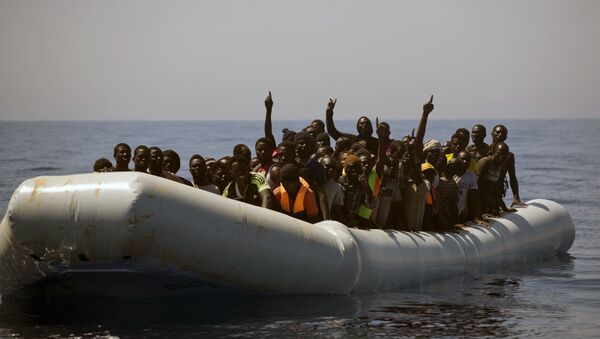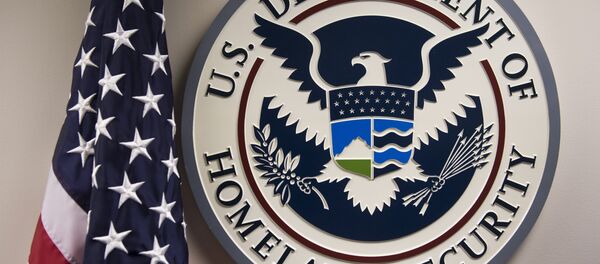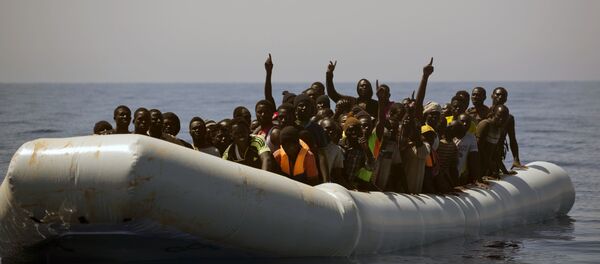Sputnik has talked about the hijacking incident with Tony Smith, Global border security consultant and former head of the UK Border Force.
Sputnik: Does this incident tell us that there should be some concern about the level of safety of UK Naval operations and border security?
Tony Smith: I don't think so, but it is unusual. We don't tend to get too many stowaways at the UK border these days but there are some, usually from Africa where the ship emanated from.
What is unusual is that the group tried to take control of the vessel by storming the bridge and causing the captain to issue a request to help from the British police, and obviously then as it was within British territorial waters it was our responsibility to respond. So police boarded the vessel last night (Friday), arrested the perpetrators. They've been brought ashore and they're now being interviewed by British police.
READ MORE: People Smuggling Ring Smashed as Migrant Death Toll Rises on Mediterranean Sea
Sputnik: How long did the whole operation last? Was it fairly quickly liquidated, it could have been a hostage situation?
Tony Smith: The news that they found stowaways on board was received about four days ago. So the stowaways were actually lawfully detained on board by the master of the vessel, which is normal practice.
Sputnik: Can you tell us about the procedures that are normally put in place to avoid stowaways?
Tony Smith: This is international law really it is not just UK law. The International Maritime Organisation has issued guidelines to disembarking ports. There are security requirements upon ports of disembarkation overseas and these processes are monitored.
Shipping owners and agents have responsibilities to ensure their vessel is secure and not carrying people who aren't entitled to be on board or any goods for that matter before it disembarks. But there have been instances, particularly, in Africa and South Africa and Nigeria of breaches. So that's where the investigation will go, back to the source to ensure how these people got on board in the first place.
READ MORE: EU, African Leaders Unite to Combat Human Trafficking in Libya
Sputnik: Do you think it could've been something having to do with corruption, was somebody paid to turn the other way and let these people get on, or is this perhaps something that's organised? There are four men, what do you think is the likely source of this? Or just a freak incident where they decided, hey let's give this a go?
Tony Smith: I think we need to wait and see what happens next before speculating. It could've been any of those things but there will now be an investigation and the shipping company won't want this to happen either. They will be very interested in how this happened because they are ultimately responsible for dealing with these people now.
So they will be very, very keen themselves ensure that steps are taken to prevent a recurrence, but I think we need to see what the investigation reveals before we can be sure about how they got on board in the first place.
Sputnik: How serious is the problem of stowaways? Does it happen often? I know that this is an unusual situation because they tried to actually make demands and threaten the crew but is it common to see stowaways that try to illegally cross borders or migrate through that kind of method?
Tony Smith: Not really. It's far less common than it used to be but it still does happen. What we do tend to find now is that illegal migration is basically coming through land borders or increasingly maritime routes. We've had a lot of concerns here in the UK in the last few weeks.
A number of small vessels and dinghies loaded with Iranian families have been crossing very dangerous shipping lanes to land on the southern coast of England. Smugglers will try pretty much anything in order to try and breach border defences and the various border agencies around the world are up against serious problems because it's a very lucrative business. But I wouldn't say stowaways are at the top of the charts by a long way. It's far more likely to be irregular migration either by land or by sea.
READ MORE: 'Fighting Traffickers': EU Commission Launches New Migration Programs in Africa
Sputnik: Do you think there is going to be more attention to this now? Obviously, there's going to be an investigation to find out what this all was, whether this was an organised attempt to traffic people or I guess we'll have to wait until that comes out to understand if there's any likelihood that this will happen again and if any additional measures will be taken to prevent this kind of incident.
Tony Smith: The focus here right now is on international cooperation because no one country can deal with this on its own. So we do need international support. The UK government is working with our neighbours in France and in Belgium, and in the Netherlands to stop smuggling and trafficking, and we need the international community to come together to condemn that type of activity; because at the end of the day, this is international organised crime.
It's a very lucrative business and it can be really, really dangerous and my main worry is that someone's going to perish if we can't get to the bottom of this and stop this type of trade from happening.
Sputnik: Can you tell us about how Brexit is going to impact the whole situation with maritime borders, you said, of course, you need international cooperation, how is the cooperation with EU is going to change post-Brexit? Of course, we don't know what kind of Brexit we're going to have.
Things like jurisdiction over international waters and being able to work together with our European friends and partners even though we're not part of the European Union, by way of bilateral arrangements. It's really hard to see what would happen if there is no deal. One would hope that we would continue to have cooperation between agencies both in the UK and on mainland Europe to stop to smuggling and trafficking.
READ MORE: UK Wrongly Tried to Expel 300 Skilled Migrants Under Anti-Terror Rule — Reports
But that is an express provision in the withdrawal agreement so one would hope that does get approved and we can continue to work with our friends and colleagues in Europe outside of the EU, but nonetheless behind this common purpose of stopping human trafficking and human smuggling.
Views and opinions, expressed in the article are those of Tony Smith and do not necessarily reflect those of Sputnik





